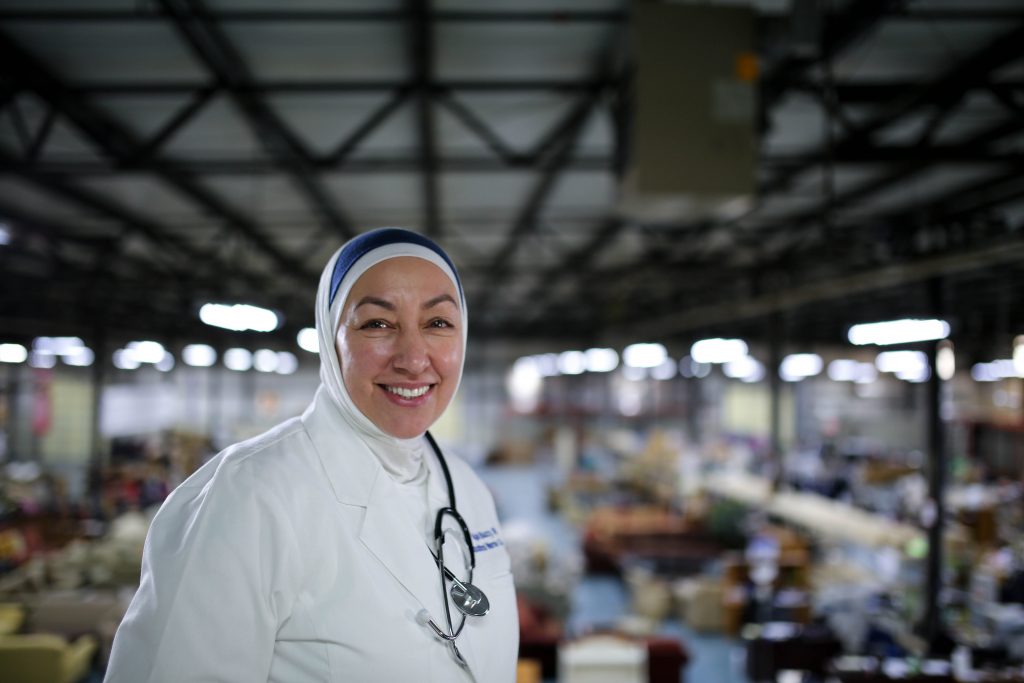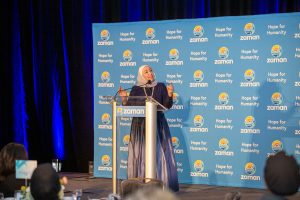Global Woman Magazine names Najah Bazzy a female Muslim thought leader
Bazzy is the CEO and founder of the needs-based community nonprofit, Zaman International.

Zaman International CEO and Founder Najah Bazzy was recently named a female Muslim thought leader by Global Woman Magazine
Zaman International is a needs-based community nonprofit humanitarian organization that aims to break the cycles of poverty for marginalized women and children. Recently its founder and CEO, Najah Bazzy, was named as one of six female Muslim thought leaders by the Global Woman Magazine. In 2019 she was named as one of the top 10 CNN heroes for her work with Zaman.
Bazzy says she started Zaman as a result of her transcultural nursing work, which brings the cultural theory model to the bedside. Zaman means “time” in Arabic, referring to an era of time in the stewardship of each other.
Listen: Najah Bazzy talks about her work with Zaman International.
Humble beginnings
In 1996, Najah Bazzy was caring for an Iraqi refugee family, who had a baby who was dying in the hospital. As a transcultural nurse, she negotiated to have the baby taken home.
“I got the baby home on the ventilator,” says Bazzy, “with hospice and then I went to visit the family. And there was nothing in the house. And that’s when I saw that they built a baby crib out of a laundry basket so the baby was dying in a laundry basket… on clean white towels.”
Bazzy thought the family was moving in. That wasn’t the case.
“They simply had nothing. I left that house and cried my eyes out and called my mom. We rented a U-haul truck with my children and we emptied everything out of my house and her house… to fill their home.”
She says that was her first glimpse at poverty alleviation.
The organization grew out of Bazzy’s minivan starting in 1996, formally becoming Zaman International, in 2004 becoming a nonprofit which helps marginalized women and children in Metro Detroit and globally. Later they crowdfunded to open a location in Inkster in 2016.
“I feel like it [Zaman] runs a parallel with the resilience that the women that we take care of because I wasn’t going to give up… the idea of just getting the work done, not thinking about an address, not caring if there was a building, not even caring if there was an organization. Really just caring about the need.”
Breaking the cycle of poverty

Zaman International works off the model of meeting people where they are and asking them how they want to be helped. She says preserving the dignity of people is a core value. The nonprofit provides vocational training, workplace readiness, and job placement assistance to help break the cycle of poverty, says Bazzy.
She says two of those programs are the Rising Hope Bakery culinary program and the industrial sewing center. She says since December Zaman has hired 10 clients as employees with a living wage.
“I feel like giving the handout is not just pulling that person in that family out of poverty like almost physically out of the state of poverty. But it builds something inside that Mom, where she knows she has a purpose and she has self-worth. And that kind of dignity to me is paramount.”
Using faith, spirituality, and justice as a framework

Bazzy says spirituality and faith play a role in her work.
“I believe in justice and that’s how my faith translates into Zaman. I believe in human equity.”
She says it’s up to us to take care of each other with what God has given us.
On recently being named one of six female Muslim thought leaders by Global Woman Magazine, Bazzy says she feels honored.
“But I also feel a sense of responsibility that in how it is that we as Muslim women can not only open doors for Muslim women but how can Muslim women influence the world.”
Bazzy hopes Zaman will become a household name, “from a public perspective, from a policy perspective. I want Zaman to be on the floor at the Senate battling for poverty alleviation in the United States.”
She hopes the Zaman model will become a global movement.
Trusted, accurate, up-to-date.
WDET strives to make our journalism accessible to everyone. As a public media institution, we maintain our journalistic integrity through independent support from readers like you. If you value WDET as your source of news, music and conversation, please make a gift today.
